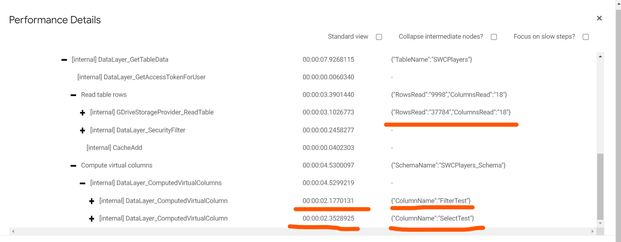- AppSheet
- AppSheet Forum
- AppSheet Q&A
- Performance Query about SELECT and FILTER
- Subscribe to RSS Feed
- Mark Topic as New
- Mark Topic as Read
- Float this Topic for Current User
- Bookmark
- Subscribe
- Mute
- Printer Friendly Page
- Mark as New
- Bookmark
- Subscribe
- Mute
- Subscribe to RSS Feed
- Permalink
- Report Inappropriate Content
- Mark as New
- Bookmark
- Subscribe
- Mute
- Subscribe to RSS Feed
- Permalink
- Report Inappropriate Content
performance query
Which expression is faster performance wise, SELECT() or FILTER(), assuming I only need to get the RowID?
Example:
SELECT(Customers[RowID],USEREMAIL()=[User ID])
FILTER("Customers", USEREMAIL()=[User ID])
In my ignorance I think that Filter since it calls the RowID while Select works a little more looking for any column in the table as a LOOKUP(), however I think I am ignorant about this topic. I appreciate your visions.
Solved! Go to Solution.
- Mark as New
- Bookmark
- Subscribe
- Mute
- Subscribe to RSS Feed
- Permalink
- Report Inappropriate Content
- Mark as New
- Bookmark
- Subscribe
- Mute
- Subscribe to RSS Feed
- Permalink
- Report Inappropriate Content
I concur with @1minManager
I think FILTER() is somewhat special representation of SELECT() in that FILTER() works with only key values. Apart from that there is no significant difference in processing for same number of rows.
I was carrying out a test to test the statement above. 🙂
My test on a 37 K rows public dataset table showed that once FILTER() ran faster and at other sync operation, SELECT() ran faster. So there is really no significant difference.
test : 1 results as below
Test 2 : On the same data source after some time the test 1 was performed is as below
Filter expression used in testing:
FILTER("SWCPlayers", [Team Initials]="FRA")
SELECT () expression used in testing
SELECT( SWCPlayers[ID], [Team Initials]="FRA")
Hope this helps.
- Mark as New
- Bookmark
- Subscribe
- Mute
- Subscribe to RSS Feed
- Permalink
- Report Inappropriate Content
- Mark as New
- Bookmark
- Subscribe
- Mute
- Subscribe to RSS Feed
- Permalink
- Report Inappropriate Content
My understaning is that FILTER() and LOOKUP() are based on a SELECT() query anyway. So the performance difference will be minimal. Do a search for other ports about performance which go into more detail about this subject.
Simon, 1minManager.com
- Mark as New
- Bookmark
- Subscribe
- Mute
- Subscribe to RSS Feed
- Permalink
- Report Inappropriate Content
- Mark as New
- Bookmark
- Subscribe
- Mute
- Subscribe to RSS Feed
- Permalink
- Report Inappropriate Content
I concur with @1minManager
I think FILTER() is somewhat special representation of SELECT() in that FILTER() works with only key values. Apart from that there is no significant difference in processing for same number of rows.
I was carrying out a test to test the statement above. 🙂
My test on a 37 K rows public dataset table showed that once FILTER() ran faster and at other sync operation, SELECT() ran faster. So there is really no significant difference.
test : 1 results as below
Test 2 : On the same data source after some time the test 1 was performed is as below
Filter expression used in testing:
FILTER("SWCPlayers", [Team Initials]="FRA")
SELECT () expression used in testing
SELECT( SWCPlayers[ID], [Team Initials]="FRA")
Hope this helps.
- Mark as New
- Bookmark
- Subscribe
- Mute
- Subscribe to RSS Feed
- Permalink
- Report Inappropriate Content
- Mark as New
- Bookmark
- Subscribe
- Mute
- Subscribe to RSS Feed
- Permalink
- Report Inappropriate Content
Thank you @Suvrutt_Gurjar for your time and for trying this out. Thank you so much! Of course it works for me
- Mark as New
- Bookmark
- Subscribe
- Mute
- Subscribe to RSS Feed
- Permalink
- Report Inappropriate Content
- Mark as New
- Bookmark
- Subscribe
- Mute
- Subscribe to RSS Feed
- Permalink
- Report Inappropriate Content
-
Account
1,677 -
App Management
3,100 -
AppSheet
1 -
Automation
10,325 -
Bug
984 -
Data
9,677 -
Errors
5,734 -
Expressions
11,782 -
General Miscellaneous
1 -
Google Cloud Deploy
1 -
image and text
1 -
Integrations
1,610 -
Intelligence
578 -
Introductions
85 -
Other
2,906 -
Photos
1 -
Resources
538 -
Security
828 -
Templates
1,309 -
Users
1,559 -
UX
9,113
- « Previous
- Next »
| User | Count |
|---|---|
| 42 | |
| 28 | |
| 25 | |
| 22 | |
| 13 |

 Twitter
Twitter
